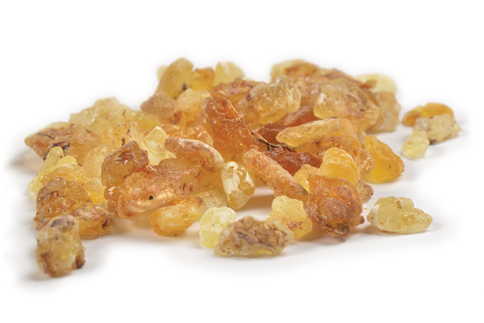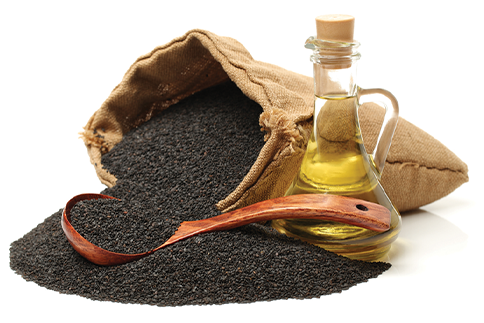Think I’m exaggerating?
Skip the Acetaminophen—There’s a Better Choice
Acetaminophen is the leading cause of acute liver failure in the United States—and that can be caused just by taking the standard recommended dose! This drug also accounts for more than 100,000 calls to poison centers. And the use of this readily-available, and supposedly safe, over-the-counter drug is responsible for about 60,000 emergency room visits and hundreds of deaths every year in America.
And yet, despite its obviously dangerous attributes, this pain reliever is part of more than 600 over-the-counter (OTC) and prescription medications. Curcumin and boswellia provide an incredibly effective—and safe—alternative. Curcumin combined with turmeric essential oil for enhanced absorption fights COX-2 and a multitude of inflammatory signals. Boswellia, standardized for higher levels of the key compound, AKBA, boosts the botanical’s 5-LOX fighting power. Emulsifying these ingredients with black sesame oil has the potential to speed the dispersion of these botanicals even more.
Consider this: acetaminophen alone is the leading cause of acute liver failure in the United States. It accounts for more than 100,000 calls to poison control centers yearly.
Additionally, the use of this readily-available, over-the-counter drug is responsible for about 60,000 emergency room visits and hundreds of deaths every year in America.
We have needed a better solution to stopping pain for a long time. The botanical ingredients that can stop pain have been well-known to Ayurvedic practitioners for centuries. And two of them, curcumin from turmeric and boswellia (also known as frankincense) have gained a well-deserved reputation worldwide as extremely effective anti-inflammatories.
The third ingredient to relieve sudden, acute pain is black sesame seed oil. While not as well known in North America, traditional use and modern research around the world have shown sesame seed to be incredibly valuable. Combine the three in a specific ratio, with a new groundbreaking and clinically proven technology and you have pain relief that matches any over-the-counter drug, but without causing liver damage, eroding the stomach lining, or further risking your health.
I’m going to give a brief overview of each ingredient in this combination and then tell you about the exciting results of a recent study that combined all three.
Curcumin from Turmeric (Curcuma longa)
Curcumin from turmeric is one of the world’s leading, natural pain medicines. This compound fights inflammation throughout the body, and has been well-studied for treating muscle soreness and chronic conditions like knee osteoarthritis and rheumatoid arthritis.
Sports medicine has been taking notice of curcumin for some time. In a double-blind, crossover trial, participants started taking curcumin two days before a physical workout and continued for three days after. Those taking curcumin noted moderate to large reductions in pain and slightly increased performance (due to the pain reduction). The exercises included gluteal stretches, squat jumps, and single-leg jumps, to get in a variety of controlled movements to replicate the wide range of motions that can cause pain during a workout.
Another study looked at the effects of curcumin for adult recreational cyclists. Those in the curcumin group reported feeling better than those in the placebo group and less stress during training days that involved two hours of endurance cycling.
Researchers in this study noted that specific plasma concentrations of curcumin were required to get consistent outcomes. I would say that the easiest way to guarantee results is to make sure you have a strong, clinically studied, enhanced absorption curcumin on board to begin with that has been tested for blood retention.
But What Kind of Curcumin? Absorption is Key
When curcumin is consumed in daily meals as a component of the spice turmeric, as it is in India, the fat in the meal provides fats that help with absorption. However, curcumin is only 2 to 5% of turmeric, so a very low dose, but if you live in India, that curcumin adds up over time, which explains the lower incidence of Alzheimer’s and other inflammation-related diseases.
However, for those of us raised on a typical Western diet with little to no curcumin, there’s no way to consume therapeutic levels through food alone, no matter how many Indian restaurants you visit. Both turmeric and curcumin are difficult for the body to absorb. In fact, early research on curcumin necessitated that participants take 20 to 24 capsules a day to even reach measurable blood levels. This is impractical, which is why research now focuses on enhanced absorption curcumin. You need something that is scientifically proven, and both safe and effective to help curcumin absorb efficiently.
When you blend curcumin with the right ingredient, you don’t need large doses to get results. The curcumin I prefer is blended with turmeric oils that offers a fuller spectrum of compounds from the turmeric plant. In fact, this clinically studied curcumin is up to 700% better absorbed than plain curcumin and has much better blood retention time. Plus, the turmerones present in the oil provide their own anti-inflammatory and anticancer activity.
Boswellia (Boswellia serrata)
 Inflammation is not a singular activity in the body. In fact, there are a multitude of inflammatory pathways and one that is often overlooked and difficult to address is called the 5-lipoxygenase, or 5-LOX enzyme and pathway.
Inflammation is not a singular activity in the body. In fact, there are a multitude of inflammatory pathways and one that is often overlooked and difficult to address is called the 5-lipoxygenase, or 5-LOX enzyme and pathway.Historically, boswellia—also called frankincense —is one of nature’s most powerful anti-inflammatory medicines. It is a specific inhibitor of 5-LOX, an enzyme that activates inflammation inducing leukotrienes. It should be a favorite herb for anyone who experiences acute pain, which often has some level of 5-LOX activity.
A placebo-controlled clinical study found that people had a higher pain threshold and greater pain tolerance when taking boswellia. The reason the researchers wanted to explore this time-tested herbal medicine? Because we are still far from a breakthrough of a non-steroidal anti-inflammatory drug (NSAID) that doesn’t adversely affect the gastrointestinal or cardiovascular systems. There is simply no synthetic pain reliever that doesn’t risk your overall health. For that matter, there are no other over-the-counter medicines that work on 5-LOX inflammation pathway. Even curcumin, one of my favorites, doesn’t match boswellia on this specific pathway.
But commercially available boswellia varies greatly. The plant offers a number of compounds. Some, specifically acetyl-11- keto-β-boswellic acid (AKBA), are extremely beneficial, and most responsible for the extract’s positive effects on reducing inflammation. However, another naturally occurring boswellia compound, beta-boswellic acid, is not beneficial. In fact, it actually promotes, rather than blocks, inflammation. Researchers investigating the differences between boswellic acids have remarked that it could “activate the generation of arachidonic acid as well as activate 5-LOX and perpetuate the leukotrienes cascade of inflammation, rather than inhibit it, an effect opposite of what was intended.” Of course, that’s the last thing anyone wants when they're looking for pain relief.
That’s why I prefer a specialized boswellia extract that reduces beta-boswellic acids to less than five percent. Think of the process as being similar to decaffeinating coffee—there’s still a very small percentage of caffeine left, but not enough to cause jitteriness for most people. Plus, at the end of the process, you still have real coffee, not something artificial or cooked up in a lab. The same is true with boswellia—you can filter out the “bad” and keep the good. Ultimately, this maximizes the extract’s potency, because it does not have to fight against itself to reduce pain and muscle damage caused by inflammation. But just as importantly, you still have natural boswellia. The extract I recommend is also standardized for a minimum of 70 percent boswellic acids, emphasizing only those that increase its effectiveness, including at least 10 percent AKBA. Unstandardized extracts can provide as little as one percent AKBA and they don’t filter out beta-boswellic acid.
Black Sesame (Sesamum indicum) Seed Oil

Sesame seed oil is something we may not normally think of as an herbal medicine, but there are reasons why we should. Sesame seed oil contains compounds that have been shown to have anti-inflammatory effects for synovial (joint) tissue in cases of rheumatoid arthritis (RA). Scientific research shows that it reduces the activity of TNF-a, an inflammatory cytokine responsible for much of the damage caused by RA.
In scientific studies of osteoarthritis, too, sesame seed compounds have shown joint protecting actions. Even just one of the compounds in sesame seed, sesamin, can help increase type II collagen and prostaglandins and prevent the breakdown of beneficial fatty acids that keep joints healthy and stop painful damage.
Other work with sesame seed components, especially sesamin, has found the same results; this botanical preserves the cushioning elements of joints because it has specific anti-inflammatory strengths.
In clinical research, supplementation with sesame seed has been shown to reduce inflammatory markers, pain scores and symptoms in patients with knee osteoarthritis.
Additionally, sesame seed appears to help other nutrients absorb more effectively, having a synergistic effect on, and helping concentrate levels of vitamin E tocopherols, vitamin C, and vitamin K.
Other general research with sesame seed has found that it helps control the ratio of omega-3 and omega-6 fatty acids, helps balance cholesterol levels, and has overall immune, cardiovascular, and DNA-protective actions.
The combination of absorption enhancement and anti-inflammatory power is something that attracted researchers to sesame seed oil in their work on a pain-relieving combination that included curcumin and boswellia.
They chose to use black sesame seed as a source of the oil, because black sesame seeds are higher in beneficial lignans like sesamin and valuable phenolic compounds than white sesame seeds.
With that in mind, the curcumin and boswellia combination in this study was specially emulsified in black sesame seed oil, which helps disperse these fat soluble herbs in the intestines, where they can be absorbed into the bloodstream for optimal pain fighting ability. Additionally, black sesame seed oil also has a long history of use in Ayurvedic practice as an anti-inflammatory, and may actually help raise levels of glutathione—the body’s own master antioxidant, disease fighter, and detoxifier.
Beginning on day one of the study, the synergistic herbal combo matched acetaminophen in reducing pain intensity and pain magnitude, holding steady all the way through day seven, the conclusion of the trial. Additionally, the botanical combination was 8.5 times better than acetaminophen at reducing the emotional distress and unpleasantness associated with pain.
The fact that these herbal ingredients had this effect is not surprising. Curcumin alone has been shown to be equal to prescription medication in alleviating symptoms of depression. These symptoms have an inflammatory component, just as much as they have a biochemical one; with three powerful anti-inflammatories working through a multitude of pathways, they are more active in addressing that aspect of pain better.

In fact, there is a growing body of research that shows that because of the way acetaminophen works in the brain, it actually reduces a person’s capacity to feel empathy for another’s pain or joy. In fact, some researchers have called acetaminophen a “social analgesic” because of the way it cuts off the ability to socially connect at a basic, human level with other people. When you consider that over 600 medicines include acetaminophen, it creates a frightening picture of the way this drug can emotionally separate us from one another.
Admittedly, the emotional distress of pain is a broad category. It’s tough to put a box around how we perceive pain. In some cases, having a sense of ‘control’ over how you feel can lessen its overall impact, if not it's intensity.
For example, research shows that even though the level of pain may be the same, when people felt like they had some control over pain, if they felt less helpless, there was less emotional suffering. It seems that this herbal combination allowed people to feel they were still making some choice over how they felt, while not shutting down healthy connections in the mind that relate to empathy and goodwill.
You Can Stop Acute Pain Effectively and Without Risk
When people are in pain, they want relief, and they want it fast. Although a lot of attention has been paid to the safety risks and potential for addiction from prescription pain killers, there are deadly over-the-counter medicines hidden in plain sight, too. Acetaminophen is one of them.
Finding pain relief that is both fast-acting and safe has been nearly impossible—until now. The clinical study on a unique combination of curcumin, boswellia, and black sesame oil proves it, and opens up a whole new world for anyone who wants to relieve acute (sudden onset) pain.
Curcumin, Boswellia, and Black Sesame Oil: The Best Choice for Fighting Acute Pain
- Modulates multiple inflammatory pathways in the body, including COX-2 and 5-LOX
- Doesn’t cause liver damage, stomach upset, gastric ulcers, high blood pressure, kidney damage, or risk of heart attack
- Works as fast as acetaminophen for acute pain when emulsified in black sesame oil, a traditional Ayurvedic botanical recommended by practitioners for centuries
I prefer a combination that uses curcumin combined with turmeric essential oil and boswellia that has been standardized for higher levels of the key compound, AKBA.
These enhancements boost the pain-fighting power of each herb. With the anti-inflammatory aspect of black sesame seed oil also part of this picture, you have an incredibly effective way to stop sudden pain that also provides amazing benefits for vibrant, optimal health.
To cope with acute pain, I would recommend using Black Sesame (Sesamum indicum) Seed Oil, Curcumin (Curcuma longa) Rhizome Extract enhanced with turmeric essential oil and standardized for curcuminoid complex (curcumin, demethoxycurcumin and bisdemethoxycurcumin) and Boswellia (Boswellia serrata) Gum Resin Extract standardized to contain ≥70% Total Organic and Boswellic Acids with AKBA ≥10%, with ≤5% beta-boswellic acids.
